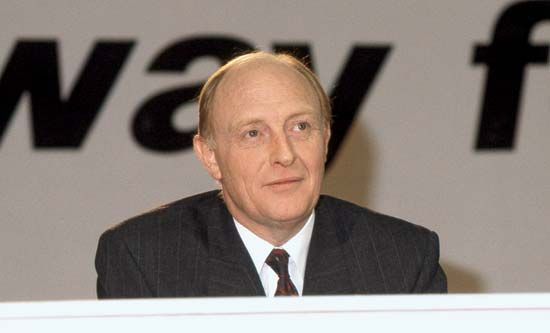Neil Kinnock
- In full:
- Neil Gordon Kinnock, Baron Kinnock of Bedwellty in the County of Gwent
- Born:
- March 28, 1942, Tredegar, Monmouthshire, Wales (age 82)
- Title / Office:
- House of Commons (1970-1992), United Kingdom
- Political Affiliation:
- Labour Party
- On the Web:
- BBC Sounds - Desert Island Discs - Neil Kinnock (Dec. 24, 2024)
Neil Kinnock (born March 28, 1942, Tredegar, Monmouthshire, Wales) is a British politician who was the leader of the Labour Party from 1983 to 1992.
The son of a miner, Kinnock was educated at University College, Cardiff, and was then for four years an organizer and tutor at the Workers’ Educational Association. In 1970 he was elected to Parliament for the seat of Bedwellty. He soon began a rapid rise in party ranks, thanks to his gift for oratory and to the patronage of party leader Michael Foot. In 1974–75 he served as parliamentary private secretary to Foot, and in 1978 he was named to the Labour Party’s national executive committee. During this period he wrote two books, Wales and the Common Market (1971) and As Nye Said (1980).
Following the election of 1983, in which Labour suffered its heaviest defeat since 1935, the search began for a leader to replace Foot. Although a relative newcomer who had never held even a junior ministerial post, Kinnock in October 1983 was elected leader of the Labour Party at its annual conference, becoming the youngest leader in the party’s history. Kinnock initially supported the party’s policy calling for the unilateral nuclear disarmament of Britain and the removal of all U.S. nuclear weapons and bases from British soil. Labour lost the 1987 general election to the Conservative Party, though it managed to increase its parliamentary representation somewhat. By 1989 Kinnock had persuaded his party to abandon its radical policies on disarmament and large-scale nationalization. Labour lost the 1992 general election to the Conservatives, and though his party had again increased its numbers in Parliament, Kinnock stepped down from his post as party leader later that year. In 1995 he retired from the House of Commons to become a member of the European Commission and served as its vice president from 1999 to 2004. Kinnock was named a life peer in 2005.











